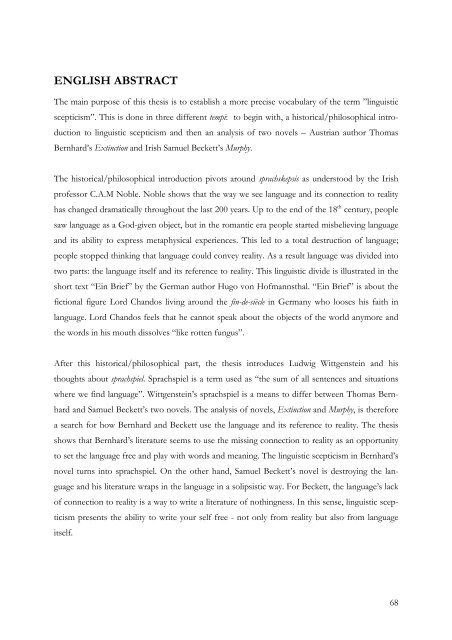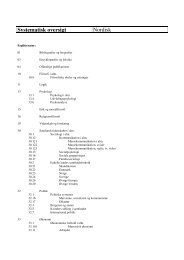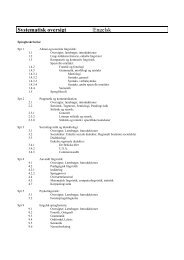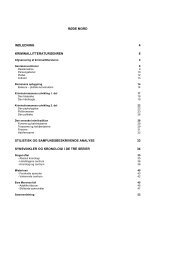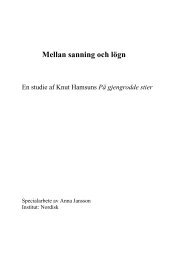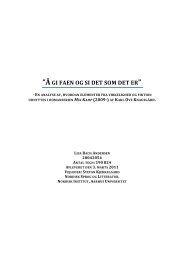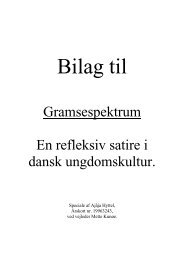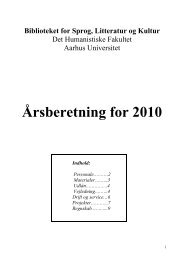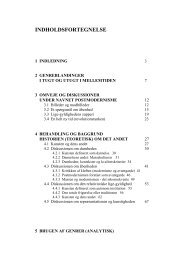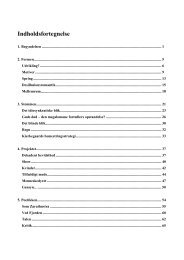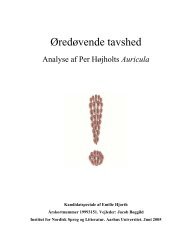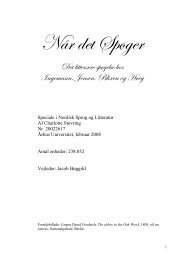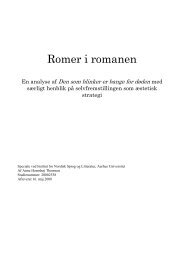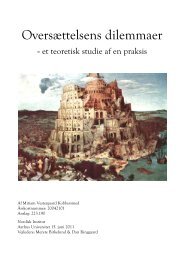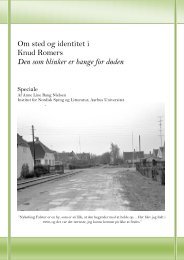1 Specialet fylder 179786 tegn, hvilket svarer til 75 - Aarhus Universitet
1 Specialet fylder 179786 tegn, hvilket svarer til 75 - Aarhus Universitet
1 Specialet fylder 179786 tegn, hvilket svarer til 75 - Aarhus Universitet
Create successful ePaper yourself
Turn your PDF publications into a flip-book with our unique Google optimized e-Paper software.
ENGLISH ABSTRACT<br />
The main purpose of this thesis is to establish a more precise vocabulary of the term ”linguistic<br />
scepticism”. This is done in three different tempi: to begin with, a historical/philosophical introduction<br />
to linguistic scepticism and then an analysis of two novels – Austrian author Thomas<br />
Bernhard’s Extinction and Irish Samuel Beckett’s Murphy.<br />
The historical/philosophical introduction pivots around sprachskepsis as understood by the Irish<br />
professor C.A.M Noble. Noble shows that the way we see language and its connection to reality<br />
has changed dramatically throughout the last 200 years. Up to the end of the 18 th century, people<br />
saw language as a God-given object, but in the romantic era people started misbelieving language<br />
and its ability to express metaphysical experiences. This led to a total destruction of language;<br />
people stopped thinking that language could convey reality. As a result language was divided into<br />
two parts: the language itself and its reference to reality. This linguistic divide is illustrated in the<br />
short text “Ein Brief” by the German author Hugo von Hofmannsthal. “Ein Brief” is about the<br />
fictional figure Lord Chandos living around the fin-de-siècle in Germany who looses his faith in<br />
language. Lord Chandos feels that he cannot speak about the objects of the world anymore and<br />
the words in his mouth dissolves “like rotten fungus”.<br />
After this historical/philosophical part, the thesis introduces Ludwig Wittgenstein and his<br />
thoughts about sprachspiel. Sprachspiel is a term used as “the sum of all sentences and situations<br />
where we find language”. Wittgenstein’s sprachspiel is a means to differ between Thomas Bernhard<br />
and Samuel Beckett’s two novels. The analysis of novels, Extinction and Murphy, is therefore<br />
a search for how Bernhard and Beckett use the language and its reference to reality. The thesis<br />
shows that Bernhard’s literature seems to use the missing connection to reality as an opportunity<br />
to set the language free and play with words and meaning. The linguistic scepticism in Bernhard’s<br />
novel turns into sprachspiel. On the other hand, Samuel Beckett’s novel is destroying the language<br />
and his literature wraps in the language in a solipsistic way. For Beckett, the language’s lack<br />
of connection to reality is a way to write a literature of nothingness. In this sense, linguistic scepticism<br />
presents the ability to write your self free - not only from reality but also from language<br />
itself.<br />
68


